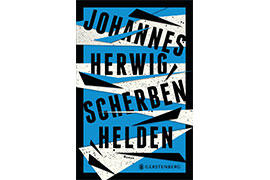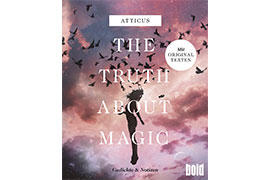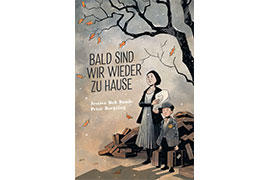
Young Adult
Sparkling, poetic, provocative – here it's all about big feelings, small intrigues and a good pinch of heartache.
Reading tips

Johannes Herwig: Outcasts
Gerstenberg, 272 pages, 16.00 €
Johannes Herwig: Outcasts
Gerstenberg, 272 pages, 16.00 €
Punks are not dead, also not in Leipzig five years after reunification. More by chance, Nino starts hanging out with guys who spend most of the day drinking and smoking pot. And they keep getting hassled by the local fascists. But Nino manages to continue his life more or less without incident. Because there are also two girls, the attractive Mila from school, and the one everyone just calls Zombie. Johannes Herwig’s second book remains true to Leipzig and takes an unsparing, but benevolent look at a special scene in a special time, seen through the eyes of his hero.

Atticus: The Truth about Magic – Poems and Notes
Translated into German by Kilian Unger. dtv BOLD, 256 pages, 16.00 €
Atticus: The Truth about Magic – Poems and Notes
Translated into German by Kilian Unger. dtv BOLD, 256 pages, 16.00 €
It all started in 2013, when Atticus began posting thoughtful, poetic short texts on Instagram. Today, 1.5 million predominantly young people around the world follow this Canadian (shall we call him a lyricist or an Instapoet?), commenting on his thoughts, sentences, verses and images. New selected poems and notes are now collected in his second book, accompanied by evocative photos. Some of the originals are even printed with their handmade typography, perfect as templates for the tattoo store. The texts have been remarkably translated by Munich-based Kilian Unger, known as a singer under the name of Liann.

Jessica Bab Bonde/Peter Bergting (Ill.): We’ll Soon Be Home Again
Translated into German by Monja Reichert. Crosscult, 108 pages, 20.00 €
Jessica Bab Bonde/Peter Bergting (Ill.): We’ll Soon Be Home Again
Translated into German by Monja Reichert. Crosscult, 108 pages, 20.00 €
Six witnesses reveal to the author their memories from the time of persecution and the Holocaust. About the ghetto in Lodz. The resettlement of Jews in Romania and Hungary. The horrors in various concentration camps and during forced labour. The final separations of parents and siblings. In clear tableaus, this graphic novel tells of six individual fates that stand for many others. The language remains clear and highly descriptive. The result is an impressive, and oppressive, depiction of the darkest chapter of German history. All six survivors are united by the desire to warn future generations about a renewed flare-up of hatred and violence – never again should this happen.
Focus on: Young Adults
Through the mirror into strange worlds
In her novel “The Tempest of Echoes”, French author Christelle Dabos concludes her quartet, the multiple award-winning fantasy series “The Mirror Visitor.” A real treat for all fans of this powerful saga.
French critics have put Christelle Dabos and her tetralogy in the same league with greats like J.K. Rowling and Philip Pullman. Rightly so. Because adding new pieces to the great puzzle of fantasy literature is not easy. But the professional librarian succeeds in inventing a fascinating and coherent world whose first volumes have already attracted a large readership worldwide. “The Tempest of Echoes” now concludes the story of Ophelia and her husband Thorn.
The Earth has become completely different: 21 so-called arks hover in the sky, ruled by family clans. Ophelia of the Ark Anima has special gifts: she can travel through mirrors and read an object's past with her hands. Gifts that are of special importance. Her clan decides to marry her to Thorn of the Ark Pole. A long story ensues full of schemes and threats.
Ophelia, the heroine of this odyssey, only slowly grows into her role: small, clumsy, hidden behind thick glasses, inseparable from her scarf reaching down to her feet. Thorn, tall and brusque, with a brilliant memory, now stands by her side in the final volume. But who is behind the destruction and supposed natural disasters on the individual arks? Is it the Other? But who exactly is this mysterious Other, whom Ophelia released unnoticed on her first journey through the mirror, but has yet to actually see? Ophelia and Thorn set out on a quest. For not only their future is at stake.

Christelle Dabos: The Mirror Visitor – The Tempest of Echoes, Vol. 4
Translated into German by Amelie Thoma. Insel Verlag, 622 pages, 18.00 €
Text: Ralf Schweikart
Portrait of: Ilona Hartmann
A river trip with father
In her debut novel “Land in Sicht” (Land in Sight), Ilona Hartmann describes a young woman finally approaching a father she never knew. A finely told, humorous story with a biographical background.

© Svenja Trierscheid
Somewhere along the way from her birthplace in Stuttgart via Leipzig to Berlin, Ilona Hartmann took up writing. Since 2012, she has been posting snippets of text on Twitter. In the meantime, she is also on Instagram. “To think in terms of observations was always my thing. And what I liked best about Twitter was the way they used language, brief and to the point.” A Twitter legend? Even though Ilona Hartmann herself feels entirely un-legendary, she has made a name for herself and found a real audience.
But with her first book “Land in Sight”, her Twitter followers will have to get used to things like capitalisation and plenty of punctuation. And on top of that, a lot more words used to describe her protagonist Jana's moments, thoughts and experiences. Jana booked a river cruise to meet her father for the first time – and he is the captain. Among all the pensioners on board, she looks back on her previous fatherless life, observes the man who is a stranger to her, and finally coming to confide in him. But it goes haltingly, as can be expected after being strangers to each other for so long.
Above all, it is the partly humorous, partly melancholy narrative tone, entirely related to Ilona Hartmann's two literary role models: Christine Nöstlinger, when she was young, and from her twenties, Saša Stanišić. “I cannot begin to compare myself with these two greats, but this is my attempt at finding my own voice.” A task at which she succeeds quite admirably.

Ilona Hartmann: Land in Sicht
(English: Land in Sight)
Blumenbar, 160 pages, 18.00 €
The protagonist's search for her father contains details of her own story, even the details of the ship and the experiences on board the “biotope”. But “a lot of things in this book are naturally stretched, over exaggerated and downplayed so that I feel more comfortable going public with this book.” Because this is a story like that of many who have grown up missing a parent.
Now this book stands alongside the author’s social media channels, where post after post shine like an endless swarm of comets. But working on a book brings about a sense of fulfilment that is anything but transient. Ilona Hartmann seems correspondingly satisfied when she states: “I feel right at home between two book covers.”
Text: Ralf Schweikart
Talk with: Ursula Poznanski
“I would love to go for a stroll through ancient Rome”
In her new novel “Cryptos”, best-selling author Ursula Poznanski spirits her readers away once more to a not-so-distant future. In a brief interview, the author reveals what is behind her story.
A new book, a new dystopian world in which everybody inhabits a realm of fantasy or adventure because the Earth itself is no longer liveable: What drives you into these rather dismal visions of the future?
Poznanski: I don't see these scenarios as dismal or depressing, but as fertile soil for stories that have not been hashed over already by hundreds of other authors. That means I can occupy new ground, leaving me a lot of freedom when writing. In addition, I always try not to create worlds devoid of hope but rather ones that still offer solutions.
Jana is the name of the world-designer who develops into a great and courageous adversary, leading the way. Did you consciously choose a female protagonist?
Yes and no. I base things on a gut feeling and I was certain that the story would work better with a female protagonist. Normally, as soon as I come up with the idea, I already have a vague outline of the main character in the distance, and I don't tinker around with it too much after that.

Ursula Poznanski: Cryptos
Loewe, 448 pages., 19.95 €, ages 14 and up
“Cryptos” is ultimately about humanity and the idea of community. Do you also see that as a message to your readers?
I have a very fundamental problem with the notion of “messages” in novels, and that goes double for young adult literature. So in that sense: no. I don't want to impart any lessons on my readers but rather raise questions that they can, but don’t have to ponder. Mostly those are questions that I myself cannot answer, and which I continue to address again and again in the course of writing – most often, they multiply themselves on their own
In which of the many worlds described in your book would you feel the most at home?
That would depend on my current mood. I would be very attracted to certain historical worlds. I would really love to stroll around ancient Rome or medieval Vienna. In passing, I would be tempted to spend some time in a fantasy world like Macandor, but right now I could really go for ten days on the beach at SeaMe.
Interview: Ralf Schweikart
Focus on: Strong young women
Fabulous discoveries
Young women are well represented in this autumn's releases: from merciless autobiography and literary self-reflection to the dystopia of the final refuge after a nuclear attack.
Paulina Czienskowski sends her heroine off on a long and painful path to confront the really important questions of life in her novel “Taubenleben” (A Pigeon's Life). They arise entirely of their own accord over the days she spends waiting for the results of an HIV test she takes after a one-night stand. It is a time of helplessness and simply trying to go with the flow of her relationship with her boyfriend. And her attempt get closer to her mother again. A calm, flowing piece of prose that leads to determined introspection.

Paulina Czienskowski: Taubenleben (English: A Pigeon's Life)
Blumenbar, 224 Seiten, 20.00 €
Mercedes Spannagel's heroine Luise in “Das Palais muss Brennen” (The Palace Must Burn) is daringly conceived: her mother is the right-wing conservative President of Austria. Which means she urgently needs to rebel in any way possible, even if it is a matter of bringing home a pug puppy named Marx to play at the feet of her mother's greyhounds. What is it like to grow up in the overpowering shadow of the President? To find her own role beyond that of the affluenza-afflicted brat surrounded by reactionaries? With a true haughty Viennese attitude, Louise disses her way through this coming-of-age story up to the point of planning an attack on the Vienna Opera Ball.

Mercedes Spannagel: Das Palais muss brennen (English: The Palace Must Burn)
Kiepenheuer & Witsch, 192 pages, 18.00 €
Unshaken self-assurance is also a central trait of Kerze, heroine of the disturbing novel “Power” by Verena Güntner. She surrounds herself with children to help her find her lost dog Power. But the situation increasingly spins out of control, and as villagers and parents confront the group of children living out in the forest, power trips and increasing radicalisation come to the forefront. A socially critical novel under a magnifying glass that demands a lot of the reader.

Verena Güntner: Power
DuMont, 254 pages, 22.00 €
When politics fails, the worst can happen. That is why the decision-makers of this world have had a luxury hotel-like self-sustaining bunker constructed in a mountainside near Frankfurt to survive nuclear war. But in order for it to succeed, they need a two-class society of rulers and servants. Janja belongs to the latter, and, in violation of the prevailing rules, falls in love with Wesley, a security guard. In his gripping dystopia “Panic Hotel – Letzte Zuflucht” (Panic Hotel – The Last Refuge), Stephan Knösel combines elements of mystery and romance into a thought-provoking story of political morality and self-control gone astray.

Stephan Knösel: Panic Hotel – Letzte Zuflucht (English: Panic Hotel – The Last Refuge)
Beltz & Gelberg, 368 pages, 17.95 €, ages 14 and up
And why should anyone read “Die Bitch Bibel” (The Bitch Bible) by social media star and, of late, musician Katja Krasavice? Because she has a lot of interesting things to explain about the fully self-reinventing character who is always bucking hard up against the borders of what is taboo, and who is not a character at all, as Katja Krasavice stresses. She talks about her difficult childhood in Teplice and later in Leipzig, about her brothers who died young and her alcoholic father. Her first attempts at YouTube. Her quick career rise despite, or rather due to her sleazy and sex-crazed image. But it also has a lot to do with self-determination and her own choice of morals and rules. An unexpected appeal for strength and female empowerment.
Text: Ralf Schweikart

Katja Krasavice: Die Bitch Bibel (English: The Bitch Bible)
riva, 208 pages, 19.99 €
Newsletter
Stay up to date about trends, offers and relevant news by subscribing to our newsletter.
